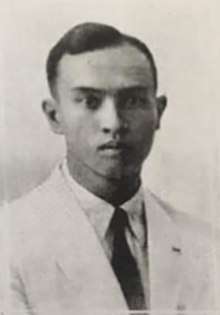Rodolfo Dato
Rodolfo Dato (April 17, 1899 - October 11, 1955) was a Filipino lawyer, editor and educator from Baao, Camarines Sur. His book "Filipino Poetry[1]", published in 1924, was one of the first anthologies of Filipino poets from 1911 to 1924. The book is regarded as the first published work to acknowledge the Filipino talents in English poetry writing in just about 20 years after the American occupation of the Philippines in 1898.

Family
Rodolfo was the second child of Eugenio Esplana Dato and Barbara Imperial Guevara. His siblings were: Francisca Dato Flores; Luis Dato (early Filipino poet and author of The Spouse, Day on the Farm, etc); Soledad "Choleng" Dato Hidalgo (one of the senior editors of Bikolana magazine published in Naga City in the late 70s; and Pablo Dato.
He married Manila Imperial Silva-Netto.
Education and degree
Rodolfo attended elementary at the Naga Elementary school, Camarines Sur; and graduated high school at the Camarines Sur Provincial High School. He earned his degree in Liberal Arts and Law at the University of the Philippines.
In 1925, he earned the degree of Master of Arts in Political Science with his thesis on "The Federal Party;" and in 1928, he earned the degree of Bachelor of Law at the University of the Philippines. He was a member of Philippine Academy of Social Sciences and was a member of the Philippine Bar.
Works and career
With the support of his brother Luis, Rodolfo edited and published the book Filipino Poetry in 1924. In his Introduction, Dato described the book as “a collection of the maiden songs of our native bards warbling in borrowed language,[1]” furthermore, that “the full flowering of our poetic art has not yet come, but the fertile field smiles abundant growth and gives promise of a rich and bountiful harvest in a day not far distant.”[1] The collection had works of early poets, writers like Maximo M. Kalaw, Fernando Maramag, Procopio Solidum, Maria Agoncillo and Luis G. Dato. The book "seems to be deeply saturated with the fragrance of the jasmines and the sampaguitas, vibrant with the mellifluous songs of the mayas..."[1]
In the editorial section of the Philippine Magazine, January 1937, AVH Hartendorp wrote: "Rodolfo Dato has recently published a second collection of verses of his brother Luis Dato. It is entitled, "My Book of Verses" and was printed by N. S. Sanchez, Naga, Camarines Sur. Seven of the forty-seven poems originally appeared in the Philippine Magazine, two sonnets as far back as 1926. One of the most beautiful poems in the book is "The Spouse", published in the January, 1934 issue. The little book should be in the collection of every one interested in Filipino poetry in English."[2]
In 1926, Dato was appointed as instructor of Law and Political Science at the University of the Philippines; and became Assistant Director of the Camarines Sur Catholic Academy (later to become the Ateneo de Naga University). In the late 1940s, he helped Dr. Jaime Hernandez during the first few years of the Nueva Caceres Colleges (later the University of Nueva Caceres), and became the first dean of the College of Liberal Arts of the university. One of the first two buildings constructed inside the University of Nueva Caceres campus was named after him -- Dato Hall.
The University of Nueva Caceres Hymn was composed by Luis Ocampo Aguirre, and the lyrics written by Rodolfo G. Dato, as written:
Nueva caceres , before
God's altar high we sing,
And pledge that ever more
To thee we'll honors bring
When thy portals fade from sightAnd darkness dims the day,
They torch shall be right
To guide us on our way
And o'er the Bicol, Land and SeaThey flag shall ever wave,
The Red and Gray for UNC
And youth upright and brave.
Rodolfo passed away in October 11, 1955 in his house in Balintawak Street, Naga City. He was 56 years old.
References
- Dato, Rodolfo (1924). Filipino Poetry. Manila: J.S. Agustin & Sons.
- Philippine magazine [Vol. 34, no. 1] Manila,: Philippine Education Co.,
External Links
Luis G. Dato Autobiographical Sketch